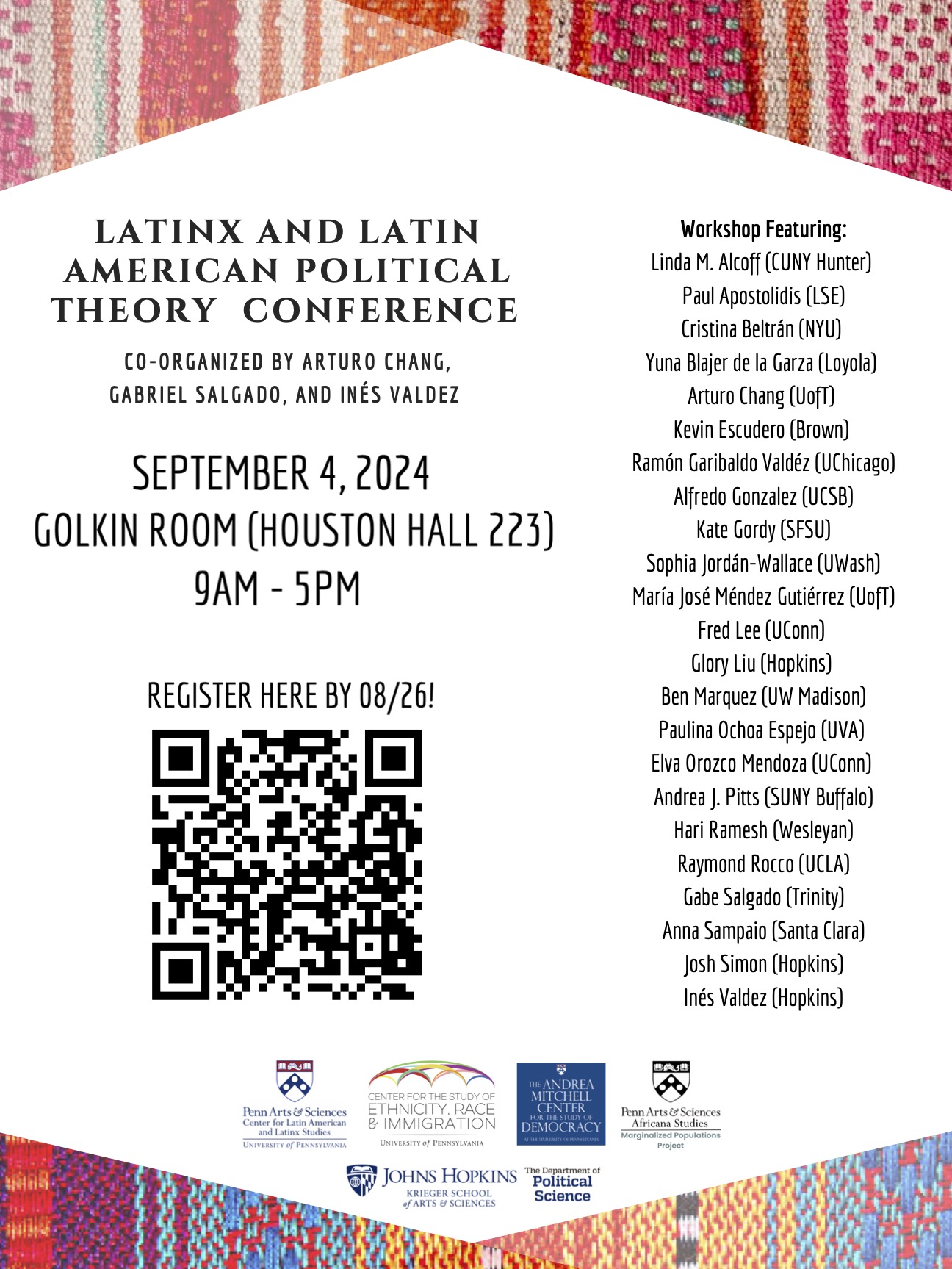Event
This conference seeks to highlight recent work on Latinx and Latin American Political Thought. The sessions illustrate the varied approaches that theorists in each tradition have taken up questions of coloniality, capitalism, subjecthood, and history, especially as they relate to borders (national, disciplinary, and others), diaspora, and resistance. The three panels and two roundtables that make up the conference each engage these questions while simultaneously interrogating yet unexplored links between Latin American and Latinx Political Thought and between Latinx Political Thought and other critical work on Latino Politics and Asian American Political Thought.
9:00 AM - 10:30 AM
Panel 1: History, Capitalism, and/or Coloniality in Latinx & Latin American Political Theory
Chair: Joshua Simon (Johns Hopkins University)
Discussant: Katherine Gordy (San Francisco State University)
Elva Orozco Mendoza (University of Connecticut) - “What’s Politics Got to Do with It? The State and Politics in Modernity-Coloniality Thought”
Gabriel Salgado (Trinity College) - “Colonial Worldmaking”
Paul Apostolidis (London School of Economics) - “Night Work, Racialised Social Reproduction, and Supply-Chain Capitalism”
Yuna Blajer de la Garza (Loyola University Chicago) - “‘Los gringos descalzos’: Mixed feelings about American immigration to Mexico”
10:30 AM - 10:45 AM Break
10:45 AM - 12:15 PM
Panel 2: Latinx and Latin American Political Theory: Border Crossings
Chair: Gabriel Salgado (Trinity College)
Discussants: Yuna Blajer de la Garza (Loyola University Chicago) & Elva Orozco Mendoza (University of Connecticut)
Arturo Chang (University of Toronto) - “Vernacularizing Decolonial Politics: Proposals from Puerto Rico & Colombia”
Inés Valdez (Johns Hopkins University) - “Latinx Luddites: Territory, Decisionism & Resisting High-Tech Migration Police”
Katherine Gordy (San Francisco State University) - “Black Marxism in Latin America: Walterio Carbonell & his Ways with History”
Cristina Beltrán (New York University) - “Brown Girl with a Gun: Latina Republicans & Intersectionality on the Right”
12:15 PM - 1:00 PM Lunch
1:00 PM - 2:30 PM
Panel 3: Difference, Subjectivity, and Resistance
Chair: Arturo Chang (University of Toronto)
Discussants: Paul Apostolidis (London School of Economics) & Joshua Simon (Johns Hopkins University)
María J. Méndez (University of Toronto) - “Rethinking Violence as Labor: Gang Lethality, Identity Formation, & Survival in Central America”
Paulina Ochoa Espejo (Haverford College) - “Territories beyond Identities: Place-based resistance to resource extraction and jurisdictional control”
Raymond Rocco (University of California, Los Angeles) - “Affect, Resistance, and the Formation of Counterhegemonic Political Subjectivities in Subaltern Counterpublics”
Linda Martín Alcoff (Hunter College, City University of New York) - “Decolonizing knowing practices”
2:30 PM - 2:45 PM Break
2:45 PM - 4:15 PM
Panel 4 (Roundtable): Convergences and Coalitions: Latinx & Asian American Political Thought
Chair: Fred Lee (University of Connecticut)
Glory Liu (Johns Hopkins University)
Andrea Pitts (University at Buffalo)
Kevin Escudero (Brown University)
Hari Ramesh (Wellesley College)
Inés Valdez (Johns Hopkins University)
4:15 PM - 4:30 PM Break
4:30 PM - 4:45 PM
Panel 5 (Roundtable): Doing Latinx Politics Otherwise: Theoretical & Historical Approaches to the Politics of Latinos
Co-chairs: Inés Valdez (Johns Hopkins University) & Sophia Jordán Wallace (University of Washington)
Ramón Garibaldo Valdéz (University of Chicago)
Arturo Chang (University of Toronto)
Ben Márquez (University of Wisconsin)
Alfredo González (UC Santa Barbara)
Anna Sampaio (Santa Clara University)
4:45 PM - 5:00 PM Closing Remarks
Co-organized by Arturo Chang, Gabriel Salgado, and Inés Valdez
Generously co-sponsored by:
- Penn Center for Latin American and Latinx Studies
- Penn Center for the Study of Ethnicity, Race, and Immigration
- The Andrea Mitchell Center for the Study of Democracy at Penn
- The Marginalized Populations Project at Penn Africana Studies
- The Hopkins Department of Political Science
